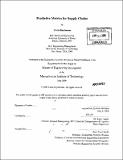Predictive metrics for supply chains
Author(s)
Haydamous, Linda (Linda A.)
DownloadFull printable version (51.83Mb)
Other Contributors
Massachusetts Institute of Technology. Engineering Systems Division.
Advisor
Larry Lapide.
Terms of use
Metadata
Show full item recordAbstract
The economic crisis that the world has been experiencing since 2008 has led several organizations to announce record losses and bankruptcies. But couldn't the chief factors have been predicted, at least to some extent? What if the critical success factors of a company are predicted and evaluated, wouldn't that eliminate, or at least cushion, such misfortunes? In this thesis I provide a framework for developing predictive metrics for supply chains. The goal of these metrics is to provide a key set of indicators, aligned with the business strategy, that provide early warnings of problems or early signals of successful project completion. They allow organizations to analyze risks and provide supply chain managers with a forward-looking approach to align their strategy with performance outcomes. My target audience is the Aerospace and Defense (A&D) industry but the results could be expanded across industries. There is no one-size-fits-all set of predictive metrics. Finding the optimal set depends on the project focus and the supplier type. In this thesis I measure performance in the four areas of cost, schedule, quality and technical. I use system dynamics models to develop my framework and employ three A&D programs as case-study subjects to illustrate the implementation of the framework.
Description
Thesis (M. Eng. in Logistics)--Massachusetts Institute of Technology, Engineering Systems Division, 2009. Includes bibliographical references (leaves 95-97).
Date issued
2009Department
Massachusetts Institute of Technology. Engineering Systems DivisionPublisher
Massachusetts Institute of Technology
Keywords
Engineering Systems Division.